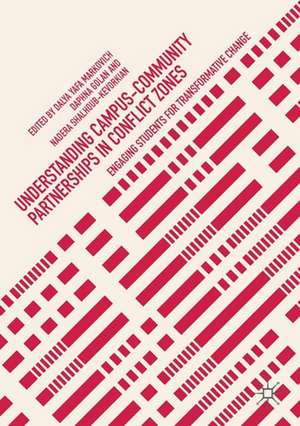Understanding Campus-Community Partnerships in Conflict Zones: Engaging Students for Transformative Change
Editat de Dalya Yafa Markovich, Daphna Golan, Nadera Shalhoub-Kevorkianen Limba Engleză Paperback – 14 aug 2020
| Toate formatele și edițiile | Preț | Express |
|---|---|---|
| Paperback (1) | 639.73 lei 6-8 săpt. | |
| Springer International Publishing – 14 aug 2020 | 639.73 lei 6-8 săpt. | |
| Hardback (1) | 645.14 lei 6-8 săpt. | |
| Springer International Publishing – 29 mai 2019 | 645.14 lei 6-8 săpt. |
Preț: 639.73 lei
Preț vechi: 752.63 lei
-15% Nou
Puncte Express: 960
Preț estimativ în valută:
122.43€ • 127.65$ • 101.75£
122.43€ • 127.65$ • 101.75£
Carte tipărită la comandă
Livrare economică 21 martie-04 aprilie
Preluare comenzi: 021 569.72.76
Specificații
ISBN-13: 9783030137830
ISBN-10: 303013783X
Pagini: 316
Ilustrații: XV, 316 p. 4 illus.
Dimensiuni: 148 x 210 mm
Greutate: 0.4 kg
Ediția:1st ed. 2019
Editura: Springer International Publishing
Colecția Palgrave Macmillan
Locul publicării:Cham, Switzerland
ISBN-10: 303013783X
Pagini: 316
Ilustrații: XV, 316 p. 4 illus.
Dimensiuni: 148 x 210 mm
Greutate: 0.4 kg
Ediția:1st ed. 2019
Editura: Springer International Publishing
Colecția Palgrave Macmillan
Locul publicării:Cham, Switzerland
Cuprins
Chapter 1. Introduction; Dalya Yafa Markovich.- Chapter 2. Engaged academia in a conflict zone? Palestinian and Jewish students in Israel; Daphna Golan and Nadera Shalhoub-Kevorkian.- Chapter 3. Power structure and everyday life: Constructing a position towards the 'Other' in Jewish-Palestinian encounters; Dalya Yafa Markovich.- Chapter 4. Campus-community partnerships in Professional Education: Architecture and planning students reflect on community-engaged courses; Rachel Kallus.- Chapter 5. From personal to critical awareness and active engagement: Consciousness shifts among students during participation in an academic course; Ariela Bairey Ben Ishay and Moti Gigi.- Chapter 6. Toward the slow movement: From fast freeway to the railway park; Diego Rothman and Eitan Shouker.- Chapter 7. Academic engagement in urban regeneration projects: Challenges in building students' critical professional identity; Rinat Tal, Tovi Fenster and Tal Kulka.- Chapter 8. A feminine occupation? The conflicts inherent to community interpreting as expressed by female student interpreters; Miriam Shlesinger, Tanya Voinova and Michal Schuster.- Chapter 9. An activist, feminist group co-facilitation model and its influence on the field; Dana Myrtenbaum and Noor Falah.- Chapter 10. Feminist critical pedagogy analysis of language aspects in collaborative writing of open source materials for children in a human rights education course; Gal Harmat.- Chapter 11. Civic engagement of students from minority groups: The case of ultra-orthodox students and communities in Jerusalem; Maya Vardi, Zvika Orr and Adi Finkelstein.
Notă biografică
Dalya Yafa Markovich is Lecturer in critical pedagogy and art education at the Faculty of Arts, Beit Berl College and the Bezalel Academy of Art and Design, Israel.
Daphna Golan is Professor at the Faculty of Law at The Hebrew University of Jerusalem, Israel.
Nadera Shalhoub Kevorkian is Professor at The School of Social Work and Public Welfare at The Hebrew University of Jerusalem, Israel.
Caracteristici
Examines campus-community partnerships at ten Israeli academic institutions Explores how these partnerships operate in a conflict-ridden society with a struggling civic culture Offers important insights into how these partnerships can contribute to transformative change in conflict zones
